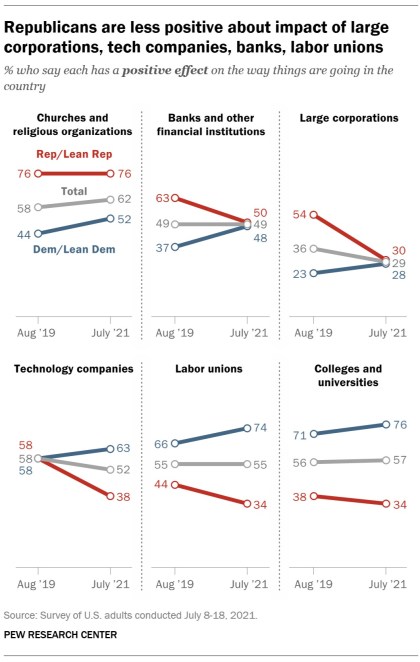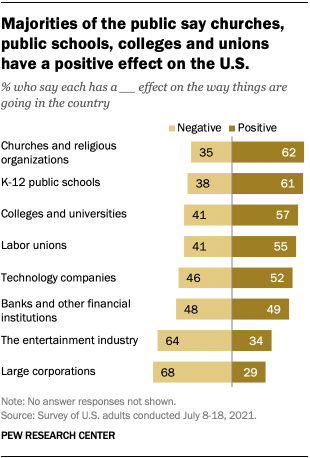Republicans are critical of how several major institutions, from large corporations and technology companies to universities and K-12 public schools, are affecting the United States. And in many cases, Republicans’ assessments have taken a sharp negative turn in the past few years.

Democrats, by contrast, are more positive than Republicans about the impact of a number of institutions and industries. And while Democrats continue to be less likely than Republicans to say that churches and religious institutions have a positive effect on the country, that gap has narrowed since 2019.
As in the past, some of the widest partisan differences are in views of the effect of colleges and universities. About three-quarters of Democrats and Democratic leaners (76%) say colleges and universities have a positive effect on the way things are going in the country today. Only about a third of Republicans and Republican leaners (34%) say the same, while 64% say they have a negative effect, according to a Pew Research Center survey of U.S. adults conducted July 8-18, 2021.
Pew Research Center conducted this study to understand how the public views several major institutions and the effect they have on the way things are going in the country. For this analysis, we surveyed 10,221 U.S. adults in July 2021. Everyone who took part in this survey is a member of the Center’s American Trends Panel (ATP), an online survey panel that is recruited through national, random sampling of residential addresses. This way nearly all U.S. adults have a chance of selection. The survey is weighted to be representative of the U.S. adult population by gender, race, ethnicity, partisan affiliation, education and other categories. Read more about the ATP’s methodology.
Here are the questions used for the report, along with responses, and its methodology.

The survey finds that partisan differences extend to views of K-12 public schools: 77% of Democrats say they have a positive effect, compared with 42% of Republicans. A 57% majority of Republicans, including nearly two-thirds of conservative Republicans (65%), say public elementary and secondary schools have a negative effect.
While there have long been wide divides between Republicans and Democrats on the impact of most institutions, Republicans’ views of several have become more negative in the last two years, while in many cases Democrats have grown more positive in their evaluations.
Since 2019, the share of Republicans who say large corporations have a positive impact on the way things are going in the U.S. has declined 24 percentage points, from 54% to 30%. Democrats have become slightly more positive toward corporations since then; positive views have risen from 23% to 28%. As a result, while there were wide partisan differences in these evaluations two years ago, there is not a significant gap today.
In recent years, Pew Research Center has transitioned from probability-based telephone surveys to the American Trends Panel (ATP), a probability-based online panel. The transition from phone surveys conducted with an interviewer to online self-administered surveys brings with it the possibility of mode differences – differences arising from the method of interviewing.
The questions used for this study were included on an American Trends Panel survey conducted July 8-18, 2021, among 10,221 adults. Trends from 2019 used in this analysis are from an American Trends Panel survey conducted July 22-Aug. 4, 2019. Previous reports that reference these questions were based on data collected on telephone surveys. Because there are substantial mode differences on these questions, phone and ATP surveys are not directly comparable.
Over the past two years, there also have been declines in the shares of Republicans who express positive views of the impact of technology companies (from 58% to 38%), banks and financial institutions (63% to 50%) and labor unions (44% to 34%) on the country. For each of these institutions, Democratic views have become more positive.

Among eight institutions and industries included in the survey, only one – churches and religious organizations – is viewed by a majority of Republicans as having a positive effect. About three-quarters of Republicans (76%) say churches have a positive effect on the way things are going in the country. By comparison, 52% of Democrats have positive views of churches, while 46% say they have a negative impact.
Since 2019, the share of Democrats who say churches have a positive effect has increased 8 percentage points (from 44% to 52%), while holding steady among Republicans.
Among the public overall, clear majorities say churches, public schools, colleges and labor unions have a positive effect.
By comparison, the entertainment industry and large corporations are viewed negatively by more than six-in-ten Americans.
Note: Here are the questions used for the report, along with responses, and its methodology.



